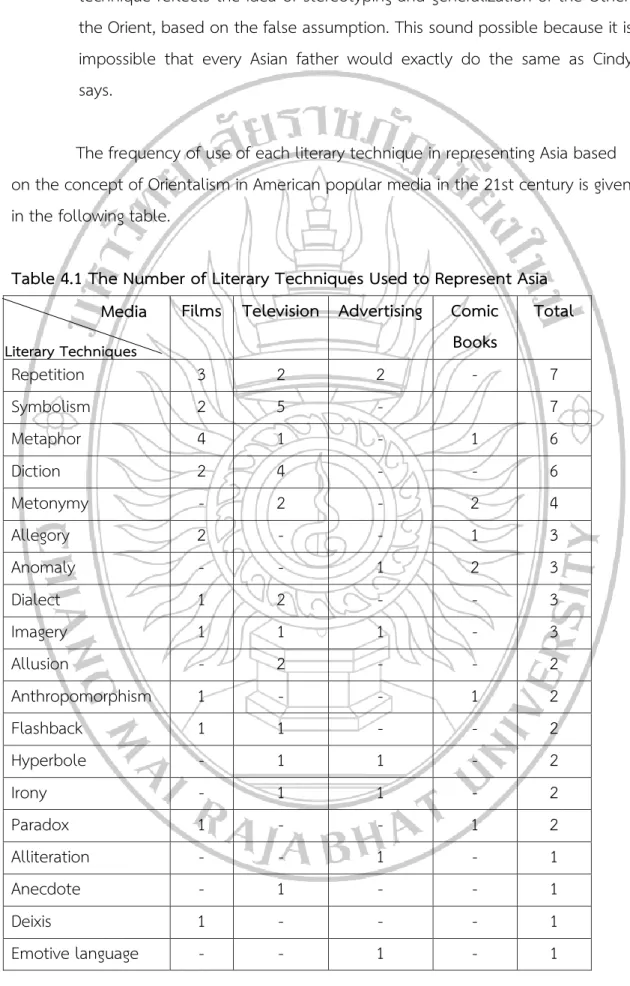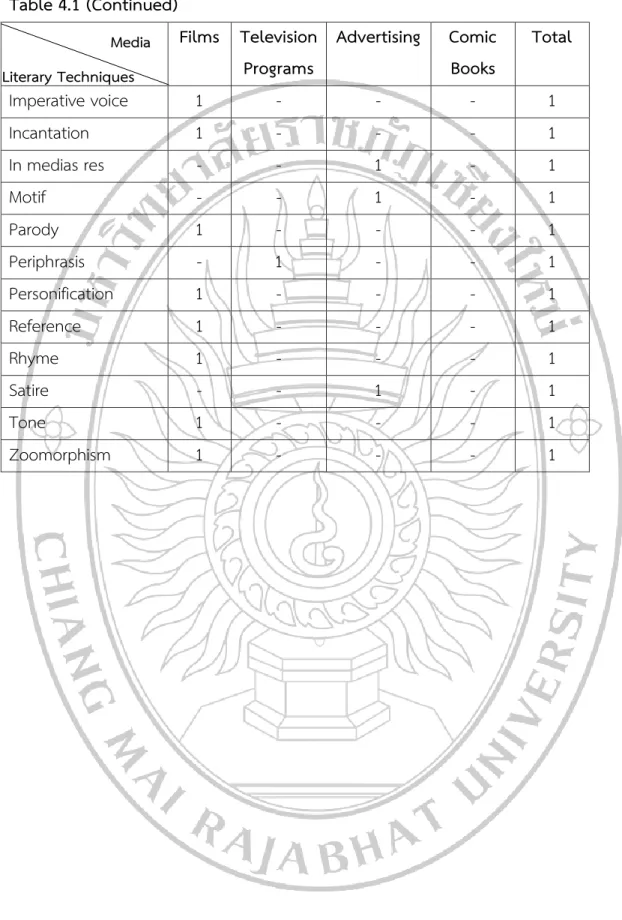Crucially, the use of deixis after the deaths of Burmese pirates, including "She," the Burmese pirates, and "her," Sarah, can reinforce the features of the Orientalist bias. The use of the word "Arabic" in this stanza explicitly indicates an exotic and mysterious place in the Middle East. The use of the flashback in this scene presumably reveals the way Aladdin is somehow portrayed as a troublesome character.
Fresh Off the Boat
- Fresh Off the Boat - Poet Boy, 2015 Dialect
- Fresh Off the Boat - Eddie Needs to Date a Chinese Girl, 2016 Flashback
- Fresh Off the Boat - The Huangs’ Dishwasher, 2017 Symbolism
- Fresh Off the Boat - Only in Mandarin, 2018 Dialect
- Fresh Off the Boat - Jessica Hits it Off with Eddie's Girlfriend, 2019
- Fresh Off the Boat - Eddie Makes a Deal to Help Evan, 2020 Metaphor
Consequently, this bad behavior may create a bad stereotype of the Asian mother in the audience's perception of this sitcom series. Jessica's use of the word 'liar' to his son can be interpreted in two ways. In this sitcom series, 'Xiaolongbao' may be a symbol of a rejection of Asian culture by Asian people living in a non-Asian country.
The phrase "lunch for white people in this sentence" can clearly show how Eddie feels about the lunch made by his Asian mother. The two symbols in this scene reflect the superiority of American (the West) culture over Asia (the East) and its influence that can define the identity of an Asian person. The use of this Asian language in this family dinner refers to the use of dialect that can reveal a sense of orientalism in this American sitcom series.
In this way, Chinese people, especially those in the older generation, accept that the inheritance of the family blood should be carried through the male side. This may reflect the status of Indian people in American society made by the author of this sitcom series based on the Orientalist perspective rooted in the perception of the West. The use of metonymy in this scene appears when Simryn recalls the time when she and her parents went to watch a game of their favorite baseball team, the Cleveland Indians.
The phrase "true Indians" in the message is seen as a metonymy, as it used to represent the Indian people as a whole.
The Big Bang Theory
Here we can only see this Indian family with the father holding a sign and saying the message loudly while the mother waves her hand at the camera and Simryn tries to avoid the camera as she is embarrassed at that moment. This way the audience can see their funny and embarrassing behavior with the message "Now the real Indians are here". and probably generalizes the stereotype of Indians as ridiculous, shameful and shameless, like this Indian family. With this, we can argue that the video depicting this Native American character with more than a million views is an effective enough data to explore Orientalist ideas using various literary techniques.
His amusing story that makes the audience laugh (we can hear the laughter in this scene) can clearly lead to a sense of humor of this Indian character. This fully shows that this Indian character certainly indulges in such a negative image that corresponds to Orientalist assumptions that associate the East as an exotic and mysterious place full of secrets and monsters. Therefore, it can be said that the characteristic of this Indian character is created in accordance with the orientalist stereotype of the eastern people, who are seen as erotic, sensual and shy human beings, whose nature has been ingrained with libidinous behavior for a long time.
If he closes it with the words, "It was us," this may imply the feelings of sexual temptation that this Indian character harbors towards the western girl. In this way, an ancient practice traditionally and religiously rooted in Asia is offended and dishonored by the Indian character who is irritated by the white character.
The Simpsons
Since the controversial issue in this American animated sitcom is mostly based on the misrepresentation of India and its culture by the Occident, the analysis will focus on some parts of The Simpsons Season 17 Episode 17 "Kiss Kiss, Bangalore" which was released on YounTube in 2019. The use of hyperbole is used throughout the scene when Homer Simpson, an American employee, flies to Bangalore, the former capital and largest city of the Indians. This literary technique clearly creates the image of this city as being located in another part of the world, where it is far away from the West, America.
As you can see, the scene uses metonymy as the phrase "the other side of the world" definitely refers to India. In this way, we cannot deny that the use of the word "subcontinent" must again refer to India. This may also reflect the negative feelings of the West towards the place in the East, namely India.
In this way, the imagery used in this scene can function to promote the Orientalist stereotype of the Indian people, based on the imagination of the West. The scene where the chairman of the nuclear power plant introduces Homer to all the Indian employees could strongly reveal an appropriate satire of a religion.
Target
At the beginning of the ad, the first sentence of the narrative uses a literary technique called "at the heart of things." In this way, it is reasonable to say that the introduction of three Asian characters at the beginning of this ad may displease its audience by obscuring it instead of impressing it. The use of anomaly in this description is clearly evident as the purpose of the advertisement is to show the effectiveness of its product which is a detergent, but this purpose is definitely contradicted by the depiction of the Asian mother in the scene.
Furthermore, the Asian mom's expression after the incident shows that she pretends to do it unintentionally. In terms of Orientalism, this characteristic of the Asian mother can touch on the stereotypes of the "Dragon Lady". Therefore, the portrayal of the Asian mother through this technique deviates significantly from what a good mother should be.
The use of hyperbole in this narrative can also suggest the strength of the American products, which incredibly causes this great relationship in a family. In the context of the pet-ownership relationship between the previously mentioned Asian mother and her daughter, the use of alliteration, which refers to the repetition of the identical sounds of initial letters in neighboring words, for the words 'fancy' and 'party' in this narrative can obviously highlighting this negative relationship between these Asian characters on some level.
Mountain Dew
The use of satirical technique can be found in the scene that the man arrives at the Shaolin monastery and the abbot comes to greet him to challenge him for hand speed. The situational irony is practically employed by the final scene in which the man who has been through tough training for several days challenges the abbot to get the can of Mountain Dew on his hand. In this scene, it can be understood that the man definitely wins the abbot as he can slap the abbot's back hand and he also admires the man by saying.
However, it turns out that even though he can hit the abbot's hand first, most of the liquid in the can is remarkably finished by the abbot. The use of situational irony here can represent the abbot, who is perceived as the head of the Shaolin monastery of all the monks, as wonderful, cunning and somewhat complicated. Furthermore, as the story of this ad is told using the limited third person point of view, the audience cannot understand or discover how the abbot can finish the drink.
The repetition of the word 'fast' appearing twice in the mere dialogue in this ad by the abbot may create a contrast between his pronunciation and his appearance. The Abbot is played by an old man who walks through the story quite slowly, but he is able to keep his hand speed at a high level because he can finally finish the potion at the end, even though his hands get slapped by the man first.
American Born Chinese
Perhaps this raises the question in the audience of how an old man who walks slowly can be faster than another young man who has undergone long training. Here we can see the use of the paradox referring to words, phrases or expressions that are logically unacceptable at first, but later reasonable. With the use of the paradox in Timmy's statement, a process of Orientalist generalization can be explored.
The use of metonymy may imply an orientalist bias towards the Asian student created by the American friend. An application of anomaly can be found through the scene where the journey to deliver the Tripitaka, the Buddha's teachings divided into three parts, begins. Therefore, it can be said that the distorted story of the Tripitaka created in this comic shows the way of misunderstanding the Orient based on Western manipulation.
The "old rice" of the world here can function as a significant metaphor that reveals a racial prejudice depicted in this character. Thus, the use of metaphor here may reinforce the racial prejudices constructed by the positional binary between Occident and Orient.
The Totally Awesome Hulk
Additionally, the next scene in which Jin uses public soap to wipe his body to get rid of unpleasant odor may reinforce the idea that Asian people are dirty and somehow undesirable compared to other American characters who never behave in this way. does not appear. The use of anomaly occurs by way of his uniform and it reveals the deviation compared to other Asian superheroes who dress in Asian styles. This could apparently imply that he would like to be accepted as part of Western society and may not be satisfied with his race.
My parents hate it when I spy, they want me to become a doctor.” The scene where Jimmy shares his problem with his friends at dinner contains the use of allegory. The allegory used reflects the idea of a "model minority" shaping the identity of Asian people in Western countries or America, as this idea refers to a minority group that is stereotyped as more successful than other groups.
Cindy's use of metonymy shows how all Asian fathers do the same thing. The frequency of use of each literary technique in the representation of Asia based on the concept of Orientalism in American popular media in the 21st century is given in the table below.

